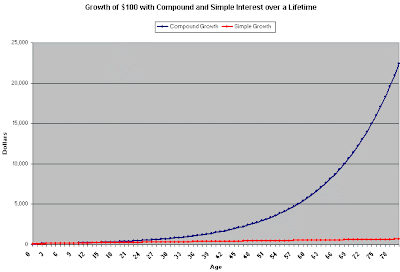
Hi All,
For this posting, I wanted to pose a question. For most of the last forty years, the conventional wisdom has been that buying and holding financial investments has been an optimal long term way to build wealth. However, last years meltdown has given a lot of people reason to reconsider this. The question therefore becomes: What are the viable alternatives to buy and hold?
The “buy and hold” strategy has a couple of components. One is compounding, the second is time. The thinking is that overall increases in corporate profitability reflected in higher share prices will be augmented by increasing stock or bond payments. Increases in equity prices and elevated payments over time will allow compounding to take effect. The end result is a high degree of wealth at retirement. The curve looks something like this:
The idea is that where there is moderate growth, then by retirement the amount of wealth starts to increase substantially due to effects of compounding. The end result should be, at least theoretically, enough money for ones golden years.
However, there are a number of problems associated with the “buy and hold” strategy. The problems are conceptual and practical.
First, conceptually buy and hold suffers from historical bias.
Most advocates of a buy and hold strategy draw on the experience of US stock and bonds markets since the great depression to show that overall financial prices and payments have a long term upward bias. However, the long run performance of some stock indexes in other industrialized countries have shown no such positive bias. For example, the Japanese Nikkei average has actually declined over the past 20 years. Other indexes like the German DAX have been essentially flat since the 1980s. So, the assumption of upward bias is highly US specific and is based on performance in the post war era.
Second, the buy and hold strategy is practically challenged.
In this regard there are two problems. First, life sometimes gets in the way of holding on to ones investments. People get divorced, illness can strike, circumstances oblige one to sell investments, wars happen, family members can fall on hard times, etc etc. Second, stock market unpredictability can torpedo your investment plan. Anyone who has been a
So, if buy and hold is out, what can you do?
This a 64,000 dollar question. Buy and hold has been extremely successful for many people. But, one should not rule out the possibility that the strategy may not work in the future. Accordingly it might make sense to consider some alternatives for securing your financial well being. As I see it, you have at least three options:
1) Modify the buy and hold strategy
2) Takeover a small company
3) Extreme savings
Some people feel that trading stocks while cleverly avoiding downturns is the best way to build wealth, however most of these people lose their money. You are probably safe rejecting market timing out of hand. On the other hand, these options are viable. They also assume you’ll keep your day job and that you have a good amount of time before retiring.
First, try a modified “buy and hold” approach.
It is possible to modify a “buy and hold” strategy with the following considerations.
1) Relative emphasis on index funds. Index fund are weighted by market capitalization. This means they will drop any companies whose share prices decline precipitously or bonds that become worthless. In other words, they automatically reject the worse losers, so your downside it limited. Index funds are also preferable for a number of other reasons that have been well addressed elsewhere.
2) Supplemental business activity. One way to mitigate the chances of buy and hold failure is to start a side business. Even if you bring in 5k to 10k a year, the difference in income can help in a number of ways. The extra money can keep you out of debt, reduce your borrowing costs or increase your passive income.
Second, buy majority shares in a small company.
If you chose the small company correctly it is possible to buy a majority interest in the firm, thereby allowing you to take control and divert profits accordingly. This is very rare, but it can be done. For example, the family that now owns Tootsie Roll Inc. did something similar in the 1920. They and their extended relatives pooled their funds and bought shares over a long period of time. After owning 51% of the available equity, they installed a new president and executive officer. It can be done. It is difficult and concentrates your wealth in a single business, but some people prefer that level of challenge.
Third, ignore investing entirely.
If buying and holding stocks won’t get you the financial security you want, its possible to switch to an extreme saving strategy. The idea here is pay off ALL your debts then switch to saving via ultra safe CDs or government bonds. This would entail something like the following progression:
1) Payoff non-deductible debt (car loans, credit cards, etc)
2) Eliminate smaller deductible debts (student loans, etc.)
3) Payoff your larger deductible debts (typically your mortgage)
Once you get started the debt payoff will take less time than you think and will result in a good amount of disposable income. This income can be saved safely via CDs or other low risk products, possibly government bonds. Ten or 15 years of saving can then secure your retirement future. Of course, you may still need to draw on your savings, but at least you will have less direct exposure to the financial markets.
If you have any other ideas for wealth building, please do leave us a comment below.
Read More
Want to Build Some Passive Income? Consider Ark7.



No Comments yet!